23 seconds: 10 years after Cadel Evans' 2007 Tour de France podium
Australian reflects on second closest Tour result in race history
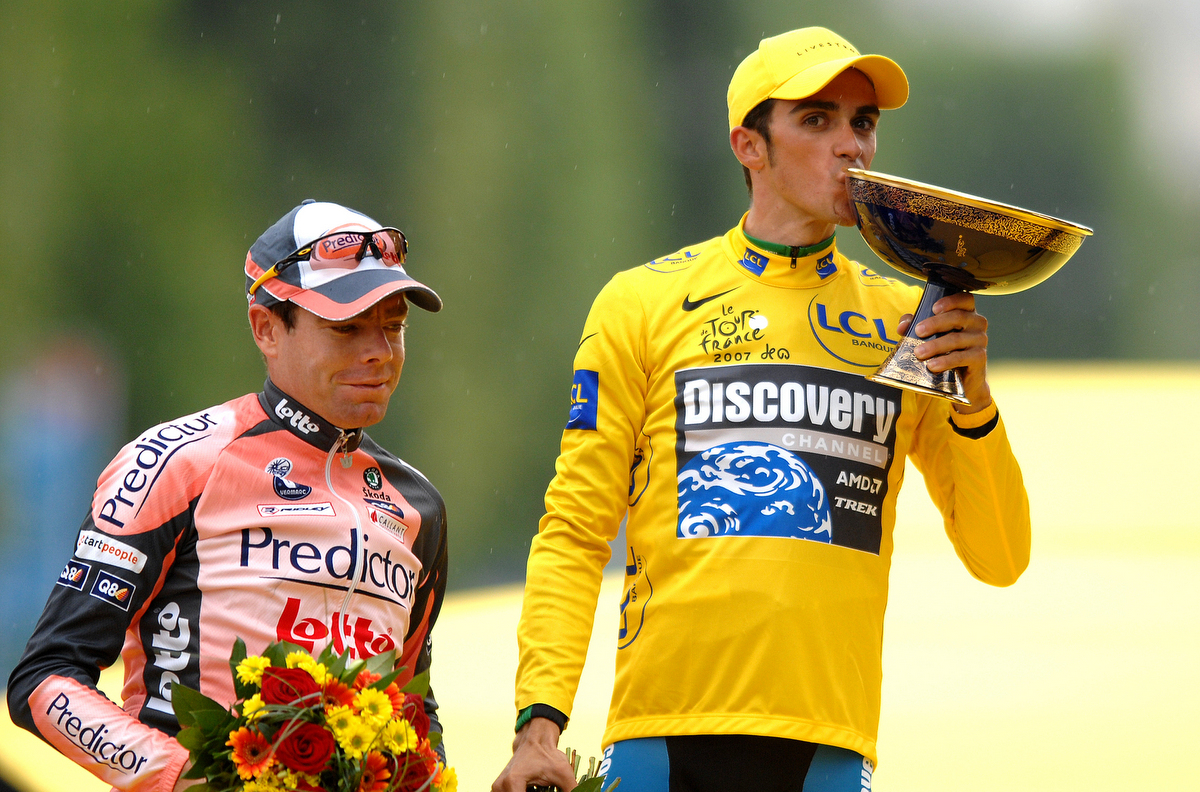
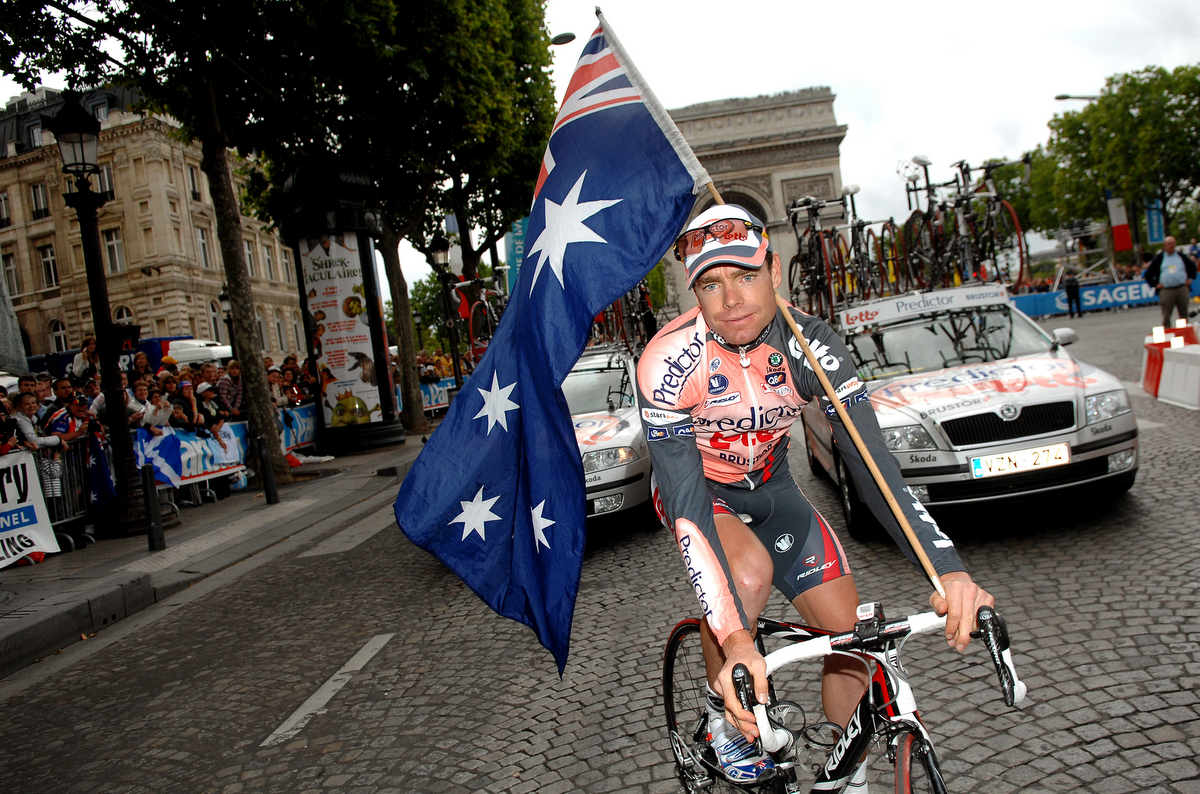
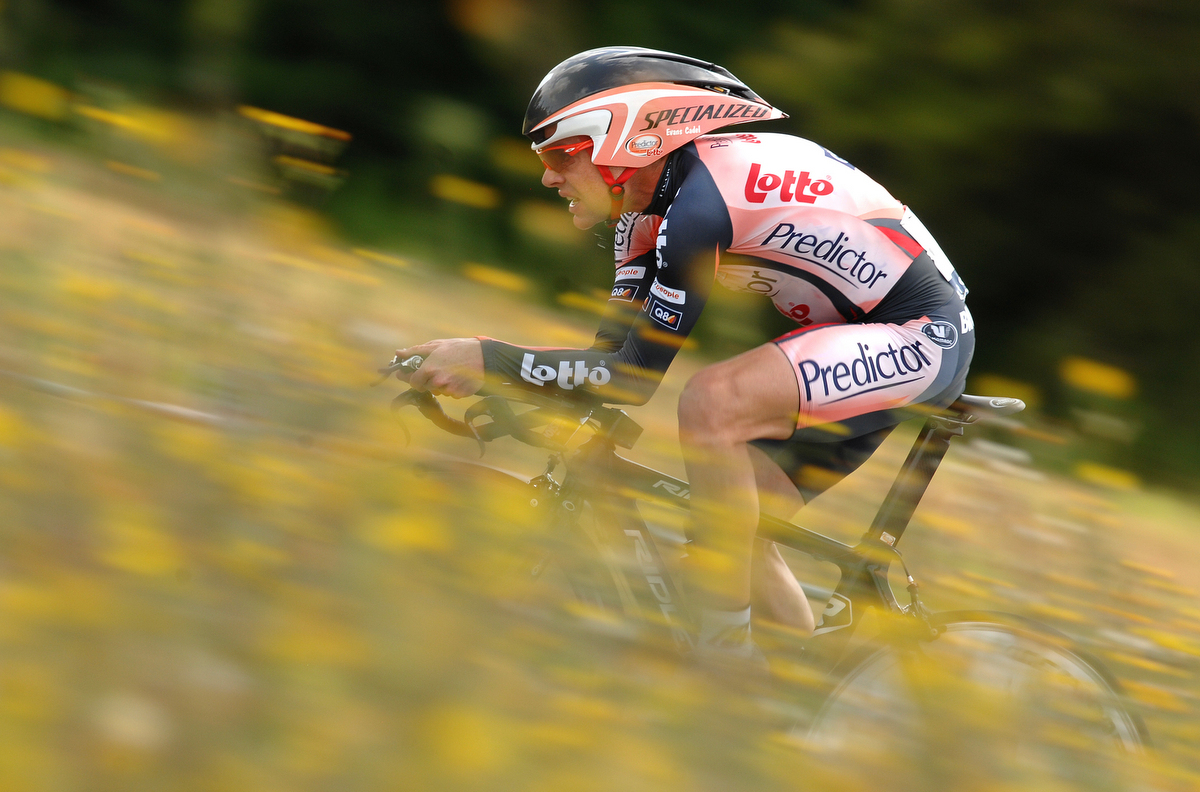
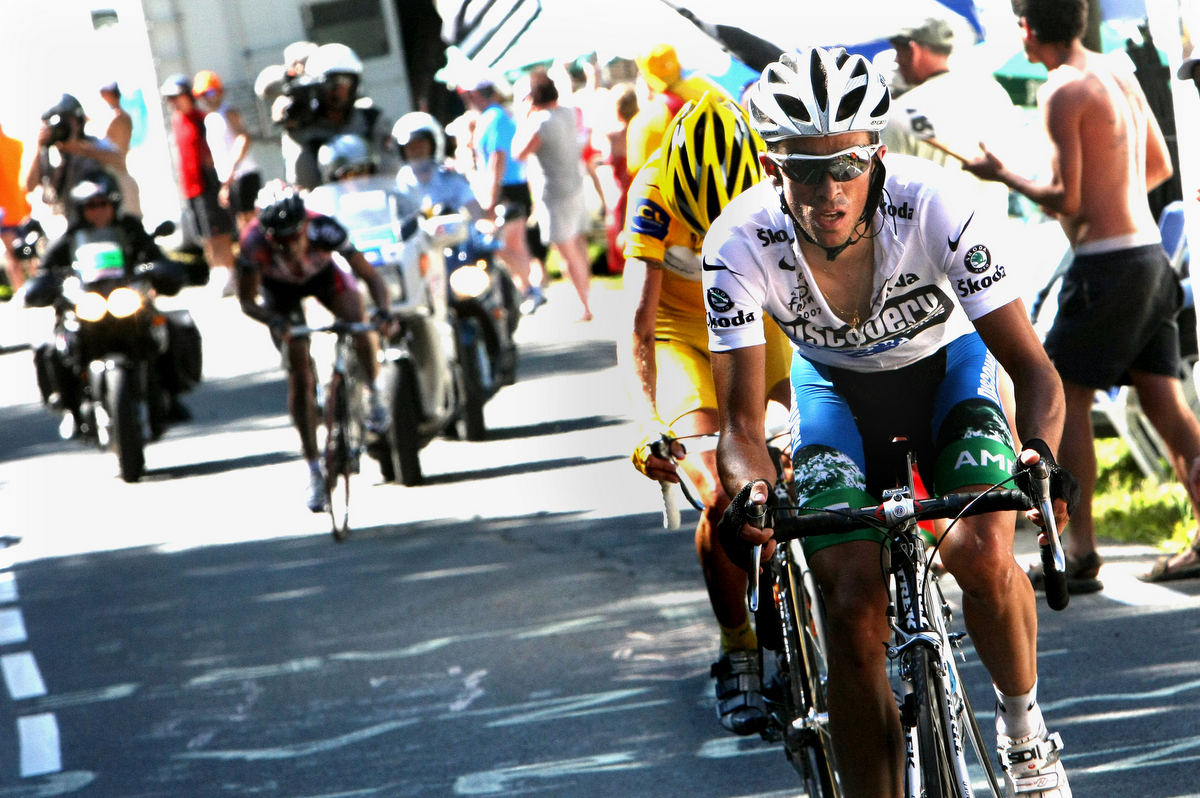
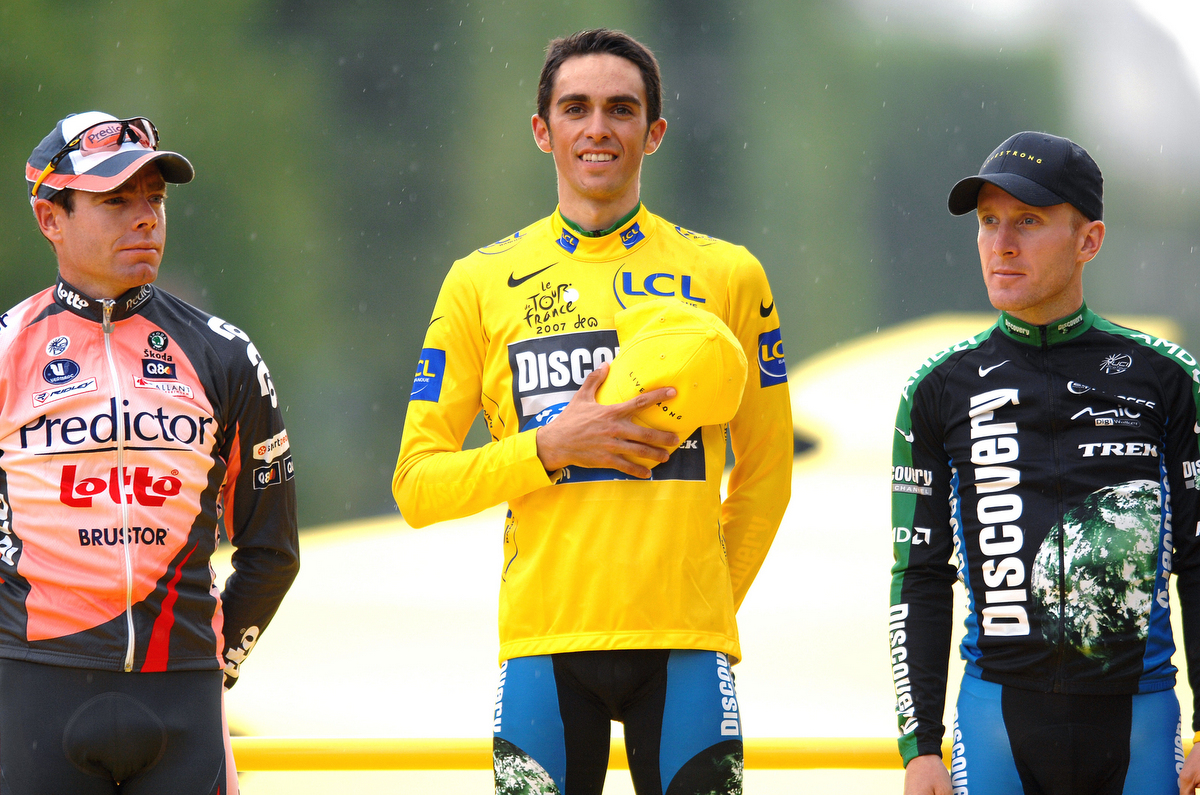
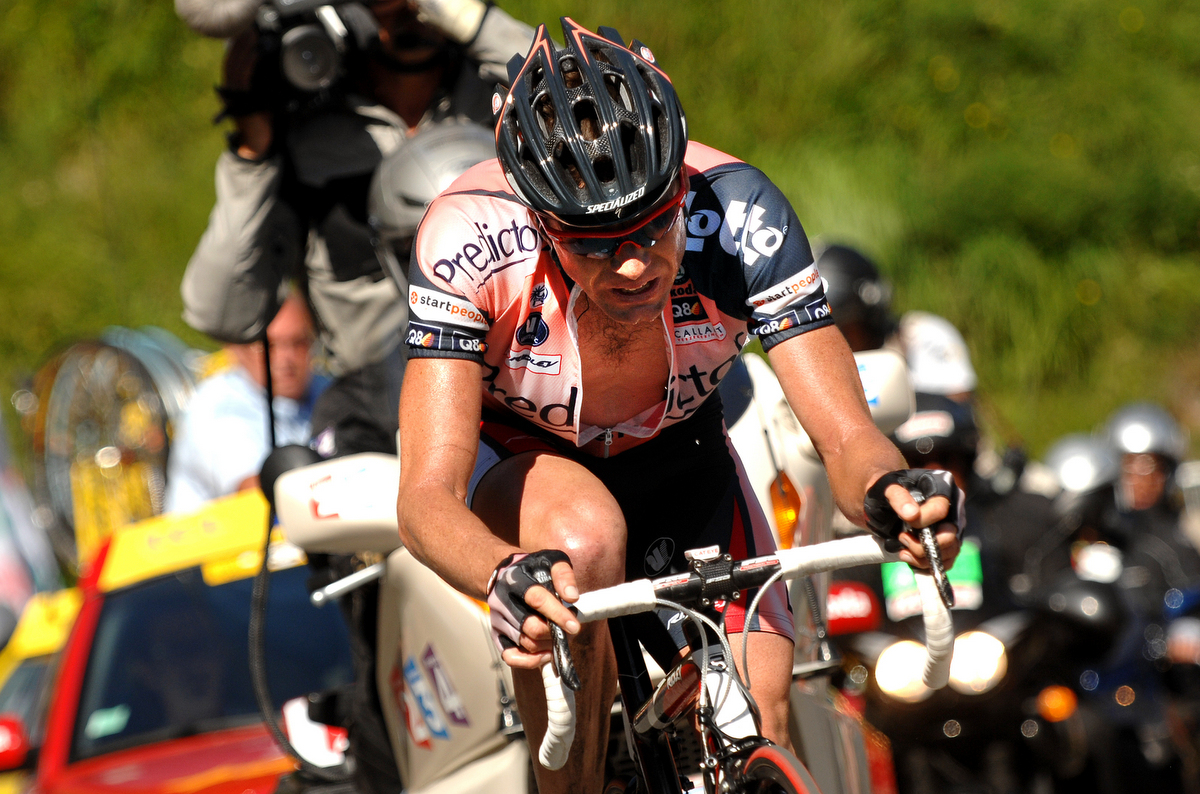
For Alberto Contador and Michael Rasmussen, the 2007 Tour de France is the race that simultaneously launched one career and ended another. For Cadel Evans, the 2007 Tour was the one that got away by an agonising 23 seconds. He would finish on the podium in second place by less than one minute again in 2008 but found salvation in 2011 when he claimed the overall victory.
Gallery: Cadel Evans retrospective
Cadel Evans: A pillar in Australian road cycling
Cadel Evans: The legacy of Australia's greatest rider
The Persistent Pro: Through the years with Cadel Evans
Cadel Evans: My career from Saeco to Tour de France glory - Podcast
Chris Froome and Cadel Evans interview each other about races, retirement and the 2008 Tour
2007 was the first year that Evans was a genuine contender for the Tour de France title after the Australian was eighth on his Tour debut in 2005 and then fifth the following year. Ten years on from becoming the first Australian to finish on the Paris podium, Cyclingnews looks back at the second closest race in Tour history.
The run in
The 2007 season started with a new team name and pink hued kit for Evans and his Lotto squad as Predictor stepped up in place of Davitamon as a co-sponsor. The racing season started in the Spanish sun at the Ruta del Sol with Evans taking a chance to stretch his legs with fifth place on stage 2. Seventh place overall at Paris-Nice, where Contador's Tour winning campaign started with a bang in Mende, was followed by a somewhat anonymous showing in Coppi e Bartali. April saw Evans head to Pais Vasco then the Ardennes, but it was the Tour de Romandie and Criterium du Dauphine where Evans' fourth and second place results ensured he would be a rider to watch in July.
Behind the scenes, it wasn't all smooth sailing with disagreements over squad and equipment selection. American Chris Horner was the main signing in the off-season to help Evans in the mountains. However, Evans would be sharing resources with sprinter Robbie McEwen who was aiming for a fourth green jersey.
The Tour de France
The 2007 Tour de France started with a prologue on the city streets of London. Evans was concerned inferior equipment would have him on the back foot before the race even arrived in France. In the 8km race against the clock, Evans lost five seconds to rivals Alexander Vinokourov, one second to Contador but took four seconds on Levi Leipheimer and 46 seconds on Rasmussen.
McEwen won stage 1 for Predictor-Lotto in an opening week for the fast men. The first test for the GC riders came on stage 8 to Tignes where Rasmussen won solo and moved into the yellow jersey. Sixth place for Evans saw him occupy the same position overall, but with a gap of 2:53 minutes to Rasmussen. A 10-second penalty for Leipheimer for drafting behind the team car would ultimately assist Evans' overall result, but there was still two weeks to race at this point.
The following stage, after the first rest day, witnessed the arrival of Mauricio Soler as the Colombian attacked on the Col du Télégraphe, kept his advantage over the Col du Galibier and won the stage into Briançon. Contador and his Discovery team lit up the race in the yellow jersey group but on the line it was Evans taking the advantage, finishing third and grabbing vital seconds over Contador, Rasmussen and Leipheimer as Vinokourov exited the GC battle.
Get The Leadout Newsletter
The latest race content, interviews, features, reviews and expert buying guides, direct to your inbox!
"Everyday that is past us is staying according to plan," the now fourth placed overall Evans told Cyclingnews at the time. "I'm sticking to myself and following my plan."
A handful of transitional stages took the peloton out of the Alps and across to the Pyrenees, but first was the significant 54km Albi time trial. A handy time trialist, Evans went into the stage looking to take time on Contador and Rasmussen. The inclement weather affected the stage for the majority of the riders expect for Vinokourov who blitzed the course. His win, aided by blood doping, would prove to be a crucial moment in the race and spell the downfall for Vinokourov.
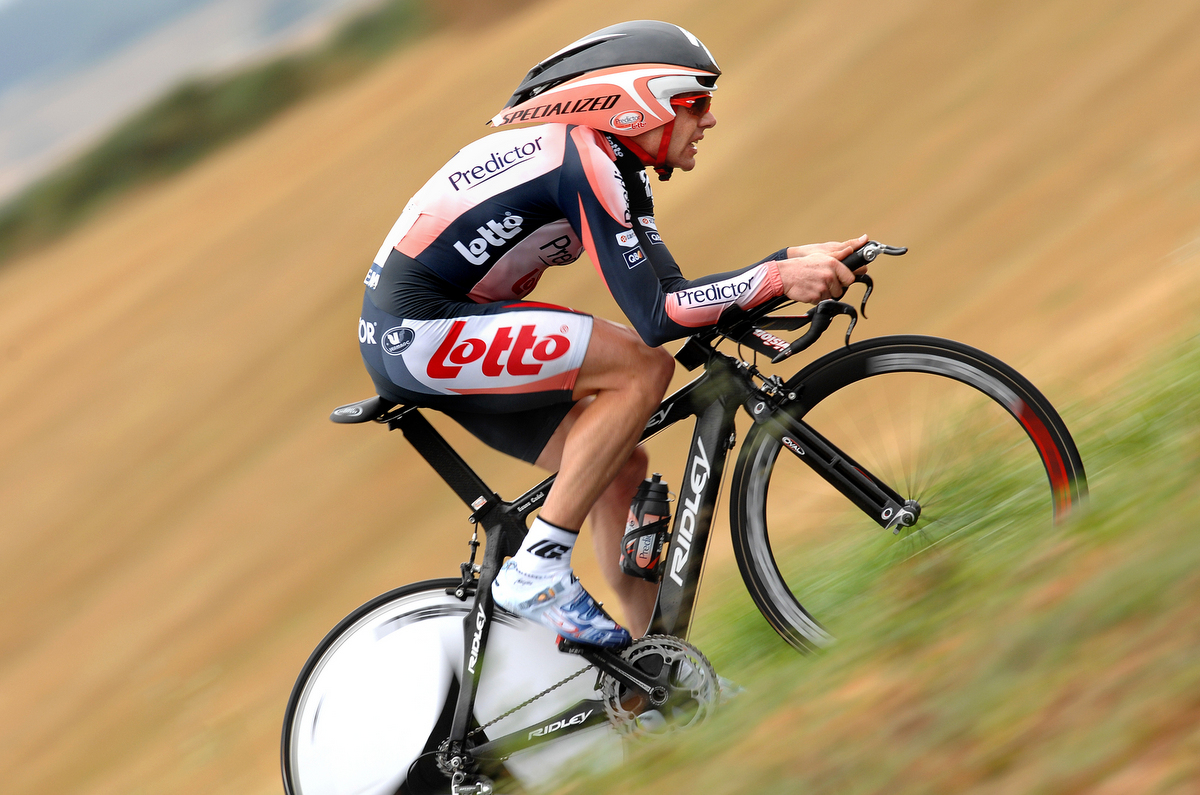
Exit Vinokourov, Astana
Second on the day, Evans would be awarded the stage win in 2008 after Vinokourov's disqualification for doping. The Australian explained he simply measured his efforts and minimised the risks in his ride and wasn't necessarily aiming for the 'win'.
"It wasn't that I lost so much time in the descents; it was because I rode conservatively and stayed on my bike. That skewed the results a little bit in that time trial. On paper, it isn't recorded who crashed, how wet the descents were and so on," Evans recounted in an interview with Cyclingnews.
The result saw Evans cut the deficit to Rasmussen, moving into second place at one minute, while Contador was third at 2:31 minutes down on the Dane. Leipheimer at 3:37 minutes, seemingly adrift of the podium. However, stage 14 to Plateau-de-Beille saw Contador and Rasmussen ride away from Evans and gain 1:52 minutes, dropping him into third place, undoing his good work against the clock.
"It was too hard, Rasmussen and Contador were stronger," Evans said at the time. "Maybe they did [take more time in the GC] but I can still gain time against the clock on them."
Stage 15 from Foix to Loudenvielle was another day for Contador and Rasmussen to tighten the screws as Evans made a tactical mistake on the advice from sports director Hendrik Redant. It is an incident he covers in his book 'The Art of Cycling' and one he recounted to Cyclingnews.
"Contador bridged across to the group and George Hincapie was there in the breakaway waiting. I was with George recently and on many occasions since, he has, of course, recounted his experiences in that stage. We were competitors then of course and now we are great friends. It is funny to hear it from that perspective but funny and painful at the same time," recounted Evans.
"On that stage, Hendrik Redant insisted that I ride within myself and rather than turn myself inside out just to stay with Contador, and maybe blow and lose more time, to lose some time but ride within myself in the chance of coming back for the final. In retrospect, it is easy to make comment but at the time I did the best that I could and Hincapie and Contador were fantastic for what they did. George has said since, you can say the race plan but to pull it off is something completely else. They did manage to pull it off and I got beaten by a better team."
The rest day followed with Evans and the team taking stock and planning for the third week knowing they could take back time in the 55.5km time trial from Cognac to Angoulême. Not included in those plans were Vinokourov and Astana as the team withdrew from the race after his doping control from the earlier time trial showed evidence of a transfusion.
The Tour returned to action without Astana, which simply served as an appetiser for that evening's events. An explosion along the course in Belagua set off by ETA was likewise a minor incident and a second entrée for what was to come. On the final climb of the day up the Col d'Aubisque, an impervious Rasmussen rode away from his rivals for a 35-second win over Contador, and 43 seconds over Evans.
With the time trial the only GC stage left in the race, Rasmussen was all but assured of the victory with a commanding 3:10 minute lead over Contador, and 5:03 minutes over Evans.
"This is a great victory since winning in the yellow jersey is very hard," Rasmussen said of his win. "Nevertheless, the overall victory is more important than a stage win.
Evans meanwhile questioned the tactics of Discovery and felt the pressure of Leipheimer in the battle for the podium.
"[Leipheimer] was working for Contador; I thought they were more interested in the win than the [final overall] podium. I know Bruyneel is not such a silly directeur, maybe he was playing with me. There were times were I could have accelerated, but when it is two to one I am always at a disadvantage."
Paris comes into view
The riders were well into their post-stage recovery and meals while journalists were filing copy after the Col d'Aubisque when the news broke through that Cofidis was withdrawing its team due to the positive test of Cristian Moreni, who had been taken into police custody. As the shock subdued of a second team exiting the race due to doping, the bombshell was dropped when Rabobank announced it was withdrawing Rasmussen from the race due to whereabouts concerns.
Without turning a pedal, Contador found himself as the new race leader and Evans was just 1:53 minutes from claiming the yellow jersey.
"Strange situation. The race was reopened and all of a sudden I am thrust into the limelight and considered a favourite to maybe even win the Tour and as an individual, that changes everything for you," Evans counted of that night. "It was a strange situation to be in and the ambience around the Tour was strange. I could feel it in the riders and the public and understandably, I felt doubt in the public as well. And rightly so. You go to bed one morning in one position and the next morning you are one place ahead when you are sitting in fourth. It is quite significant."
There was no yellow jersey in the stage 17 peloton due to the late withdrawal but it was back to normal the following day as Contador enjoyed his first day in the leader's jersey. An attentive Evans took back three seconds in the finale but it would be the young Spaniard holding the aces in the third time trial of the race.
"I will need to focus. Maybe I will watch a movie with my teammate Noval. Tomorrow morning we will go and preview the time trial. [The maillot jaune] is very good to have and I hope to keep it. Tomorrow will be the most difficult day of my sporting career and it will change my life," Contador said after his first day in yellow.
In the race of truth, it was Leipheimer who was first off of the podium men and quickly set about posting the winning time. The American bettered the previous best time of Vladimir Karpets by two minutes as the news filtered out over the radio to Evans and Contador. Evans was the only rider to come within a minute of Leipheimer, at 51 seconds, as Contador pulled out the time trial of his young career to hold on to yellow by 23 seconds.
In 2012, Leipheimer admitted to doping during the 2007 season, and also with three previous teams, which saw his results from the Tour voided. Ironically, despite Evans' pre-race issues with his time trial equipment, he goes down as the winner of both time trials. Even though the Tour records still display a vacant winner for stage 19.
"When they take the guy out in front of you it makes it a bit better doesn't it? When we speak about the GC, for me the difference was Contador had an extraordinary time trial. I didn't have a bad one, I won the stage and evidently was pretty good, but it wasn't good enough to win," Evans reflected. "The stronger rider, the better rider, won on that day and the Tour.
"In retrospect, if you make an analysis of a few things like wheels and so on, it is easy to speak in numbers but the result is the result and I am not going to blame the equipment that I had there. I probably could justify some time lost to the equipment that I had but that wasn't going to change."
Despite joking that he would sprint for bonus seconds on the Champs-Élysées, there was no change to the overall standings with Evans at 23 seconds and Leipheimer at 31 seconds to Contador. Rubbing salt into the wound for Evans was the coverage of his result, explaining he felt he was regarded as the first loser and his accomplishment was not acknowledged, as it should have.
"I wanted to win the Tour and I felt that I could. To come second was a bit deluding. As a rider you get very, a professional cyclist at least, coming second you often get criticised. I was second twice in my career at the Tour de France and both times I felt, more so the second time, but even the first, was time was that of the 200 best bike riders in the world, only one was better than me. But I was quite criticised for that result. As a sportsperson, it is not an easy job to deal with."
Not quite the agonising last day defeat of 1989, Evans' is still second on the list of closest winning margins. While Evans says he hasn't counted out 23 seconds, "I have an idea how long 23 seconds is.
"As an enthusiastic stretcher all my life, which involves holding a stretch for 30 seconds, which I did for many years, I probably have a pretty good grip of what 23 seconds is. When you do a 30-second effort, at 23 you think it is over but you are a bit disappointed you have to hang on for seven more."
Confident in his abilities and with a Grand Tour record that showed year-on-year improving, Evans may have started the Tour publicly stating the podium was his objective but once yellow became a reality he explained that having to settle for second stung.
"2007 was I think my coming of age as a real big GC contender. Our goal the previous year was to be in the first five and I was fourth and the goal in 2007 was to be on the podium. We were on the podium and we achieved our goal but of course, once we saw that maybe we could win, that became the goal which unfortunately in some ways took some of the shine, polish and joy of achieving what the goal we set to achieve."
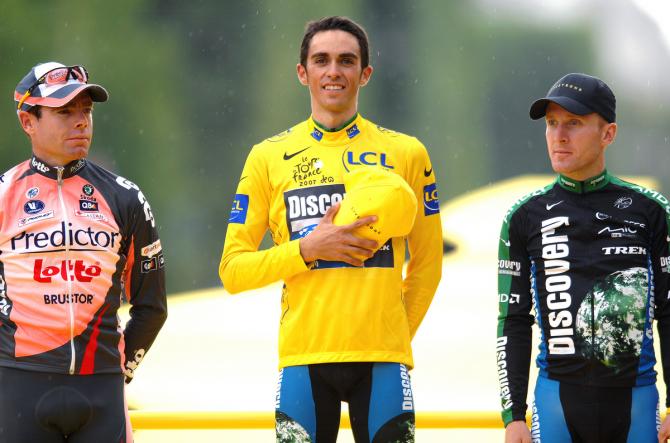
A decade on
Ten years on, or 315,446,400 seconds, Evans is into the early-years of his retirement with a Tour victory, a rainbow jersey, podiums and leader's jersey at the three grand tours just a sample of his extensive palmarès.
At the 2017 Tour de France, 19 riders from the 2007 edition of the race lined out in Düsseldorf with numerous more now in sports director and team roles. One of those riders was a debutant back in 2007 and took out the first stage in 2017, Geraint Thomas. While the majority of that list is nearing the end of the careers, Thomas Voeckler and Haimar Zubeldia doing so this month, they are still riding strongly in the peloton. Mark Cavendish arguably topping that list.
While Evans remains in the world of cycling and is regularly seen at the big events on the calendar, he doesn't miss racing and didn't beat around the bush to explain why.
"I see a very nervous and not very respectful peloton," he said, "there seems to be less and less respect with riders thinking of the here and now rather than their well being and getting along with their colleagues and so on. Overall, I would say that the danger has increased and the respect has reduced. The commitment and sacrifices of the riders has increased which has made the racing of greater depth and higher quality."
It appears fitting that ten years on from the 2007 Tour, Chris Froome finds himself defending a 23-second advantage over Frenchman Romain Bardet with three stages to race. Although that margin is expected to change before Paris, it's a reminder that after three weeks of racing, the difference between winning and losing the Tour can be less than the time it takes for a simple stretch.